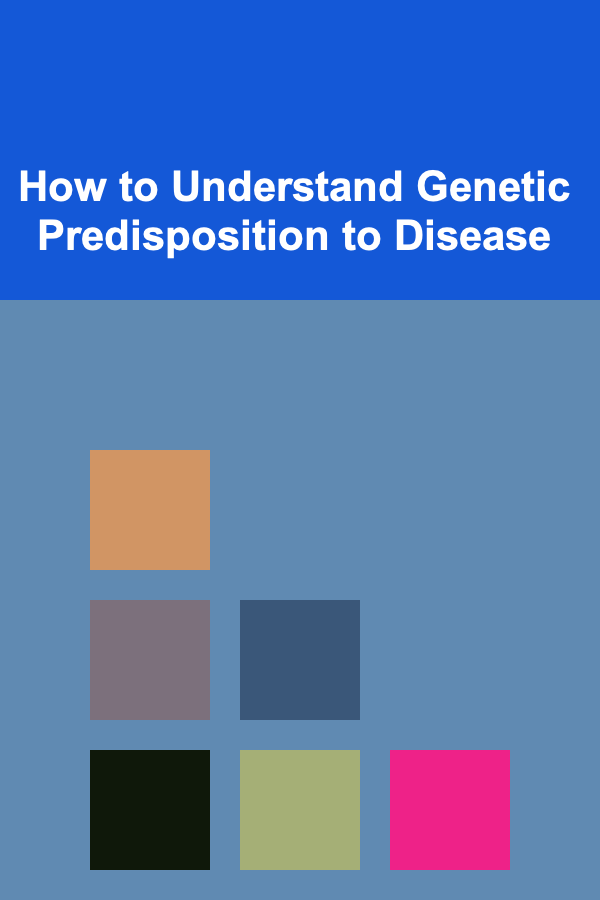
How to Understand Genetic Predisposition to Disease
ebook include PDF & Audio bundle (Micro Guide)
$12.99$9.99
Limited Time Offer! Order within the next:

Genetic predisposition to disease refers to the increased likelihood of developing a particular health condition based on one's genetic makeup. This concept is a cornerstone of modern medicine and genetics, emphasizing the role our inherited genes play in influencing our health. While lifestyle choices and environmental factors are also crucial, our genetic blueprint significantly shapes how we respond to external influences and our inherent vulnerability to diseases.
Understanding genetic predisposition involves a mix of scientific knowledge, ethical considerations, and personal health insights. In this article, we will delve deep into the science behind genetic predisposition to disease, how it is studied, and its implications for individuals and society.
The Basics of Genetics and Disease
What is Genetic Predisposition?
Genetic predisposition refers to the increased risk of developing a disease based on the presence of certain genetic variations or mutations. These variations can affect how our bodies function, how we metabolize substances, and how susceptible we are to infections or other environmental factors. These genetic predispositions are inherited from our parents and may not guarantee that a disease will develop, but they increase the likelihood.
Genes are made up of DNA (deoxyribonucleic acid) and are organized into structures called chromosomes. Human beings typically have 23 pairs of chromosomes, with one chromosome of each pair inherited from each parent. Genes located on these chromosomes encode information to produce proteins that regulate the body's functions.
Sometimes, variations in genes---whether through mutations, polymorphisms (slight differences in DNA sequences), or inherited disorders---can lead to diseases. For example, genetic mutations in the BRCA1 and BRCA2 genes increase the risk of breast and ovarian cancers.
Types of Genetic Diseases
Genetic diseases can be classified into several categories:
- Monogenic Diseases: These are caused by mutations in a single gene. An example is cystic fibrosis, which results from mutations in the CFTR gene.
- Polygenic Diseases: These involve variations in multiple genes, each contributing a small effect to the disease. Common examples include heart disease, diabetes, and certain forms of cancer.
- Mitochondrial Diseases: These are caused by mutations in the DNA of mitochondria, which are inherited exclusively from the mother. An example is Leber's hereditary optic neuropathy (LHON).
Understanding how these diseases arise and how they are influenced by genetic predispositions is a key area of study in medical genetics.
The Role of Heredity in Disease Risk
How Inheritance Works
Genetic predispositions are typically inherited in one of the following ways:
- Autosomal Dominant Inheritance: In this case, a mutation in just one copy of a gene (inherited from either parent) is sufficient to cause the disease. Examples include Huntington's disease and Marfan syndrome.
- Autosomal Recessive Inheritance: A disease manifests only when both copies of the gene are mutated (one inherited from each parent). Cystic fibrosis and sickle cell anemia are examples of autosomal recessive conditions.
- X-linked Inheritance: These diseases are caused by mutations in genes on the X chromosome. Since men have only one X chromosome, they are often more severely affected than women, who have two X chromosomes and may carry a protective normal allele. Hemophilia is an example of an X-linked recessive condition.
The inheritance pattern of a disease helps scientists predict the risk of passing it down to offspring, which is crucial for understanding genetic predisposition.
Environmental Interactions
While genes play an important role in disease risk, the environment and lifestyle choices also heavily influence whether a genetic predisposition will manifest. For example, someone with a genetic predisposition to heart disease may not develop the condition if they lead a healthy lifestyle, including a balanced diet, regular exercise, and avoiding smoking.
Conversely, individuals who have a genetic predisposition to conditions like asthma may find that pollution, allergens, or other environmental factors exacerbate their symptoms.
In many diseases, genetics and environment work together to determine disease outcomes. This concept is often referred to as gene-environment interaction. Diseases such as type 2 diabetes and some cancers exemplify this interaction, where an individual's genetic makeup may make them more susceptible, but lifestyle factors like diet and physical activity play a significant role in disease onset and progression.
How Genetic Predisposition is Studied
Genetic Testing
Advancements in genetics have enabled scientists to identify specific genes linked to disease susceptibility. Genetic testing has become a valuable tool for identifying whether someone is at increased risk for certain conditions. This testing typically involves analyzing a person's DNA through a blood sample or cheek swab to detect genetic variations or mutations.
Genetic testing can be categorized into:
- Diagnostic Testing: This helps confirm or rule out a suspected genetic condition in individuals showing symptoms.
- Predictive Testing: This identifies individuals at risk for genetic conditions before they exhibit symptoms. For example, BRCA1 and BRCA2 genetic testing can help predict the risk of breast and ovarian cancers.
- Carrier Testing: This determines whether a person carries a gene for an autosomal recessive disorder, which they could pass on to offspring.
- Pharmacogenomics: This field studies how genetic variations affect individual responses to drugs, helping tailor treatments to individuals' genetic profiles.
While genetic testing provides valuable insights, it is important to understand that a positive test result does not guarantee the development of the disease. Many diseases result from complex interactions between multiple genes and environmental factors.
Genetic Counseling
Genetic counseling plays an important role in helping individuals and families interpret genetic testing results. Counselors provide information about the likelihood of disease inheritance, available preventive measures, and options for treatment. They also address the emotional aspects of genetic testing, as discovering a genetic predisposition to a serious illness can have significant psychological and social implications.
Implications of Genetic Predisposition to Disease
Personal Health Management
Knowing about genetic predisposition can empower individuals to take proactive steps in managing their health. For example, individuals with a family history of certain cancers may choose to undergo regular screenings or adopt a healthier lifestyle to lower their risk. Similarly, people with a predisposition to heart disease may be advised to monitor their cholesterol levels and avoid smoking.
Personalized medicine, which takes into account a person's genetic makeup, is a growing field that tailors medical treatments and prevention strategies based on genetic risk. By using genetic information, doctors can recommend specific interventions, lifestyle changes, or medications that are best suited to the individual.
Ethical Considerations
The availability of genetic information raises ethical questions about privacy, discrimination, and the potential psychological impact on individuals. Genetic data is sensitive information, and there are concerns about how this data might be used by employers, insurance companies, or other institutions.
There is also the question of genetic determinism, which is the belief that genes solely dictate who we are. While genetics play an important role in disease risk, it's essential to acknowledge the complexity of gene-environment interactions and the influence of factors like lifestyle and environment on disease outcomes.
The advent of genetic testing also raises questions about the ethical implications of testing minors or individuals who cannot consent. Deciding whether to test children for adult-onset conditions such as Huntington's disease is a complex issue with significant ethical and emotional consequences.
The Future of Genetic Understanding and Disease Prevention
Advancements in Genetic Research
The field of genomics is rapidly evolving, and researchers are continuously uncovering new insights into how our genes influence disease risk. With the help of next-generation sequencing technologies, scientists are now able to sequence entire genomes, making it easier to identify genetic variants associated with complex diseases.
These advancements promise to improve our understanding of the genetic factors behind diseases such as Alzheimer's, diabetes, and various cancers. In the future, genetic predisposition may be used not only for risk assessment but also for more precise and personalized interventions, including gene therapies.
Gene Editing Technologies
One of the most groundbreaking developments in genetic research is the advent of gene editing technologies like CRISPR-Cas9. These technologies allow scientists to modify genes directly, potentially correcting mutations responsible for genetic diseases. While still in the early stages, gene editing holds promise for treating inherited diseases at their genetic root, offering the possibility of curing conditions that were once thought incurable.
However, gene editing raises ethical and safety concerns, particularly with regards to germline editing, which involves modifying the genes of embryos. As this technology advances, society will need to navigate the complex ethical landscape it presents.
Personalized Medicine and Disease Prevention
The future of genetic predisposition to disease lies in personalized medicine. Rather than relying on a one-size-fits-all approach, healthcare could be tailored to each individual's genetic profile. With access to genetic testing and counseling, people may receive more accurate predictions of their health risks and better-targeted preventive measures, allowing for early detection and more effective treatment.
Conclusion
Genetic predisposition to disease is a complex, multifaceted concept that combines our genetic inheritance with lifestyle factors and environmental influences. By understanding the role of genes in disease risk, we can take proactive steps to manage our health, prevent disease, and improve our quality of life.
As genetic research continues to evolve, we gain new insights into the human genome and how it influences disease. With this knowledge, we can look forward to a future where personalized medicine and gene therapies become integral parts of healthcare, allowing us to address diseases at their genetic roots and enhance our ability to prevent and treat conditions before they manifest. The growing understanding of genetic predisposition is a powerful tool for improving health outcomes and reshaping the future of medicine.
Reading More From Our Other Websites
- [Organization Tip 101] How to Create a Relaxation Corner in Your Family Room
- [Gardening 101] How to Rotate Vegetable Garden Plants for a Better Yield
- [Hiking with Kids Tip 101] Fun on the Trail: Creative Ways to Teach Kids Trail Signs
- [Personal Care Tips 101] How to Get Rid of Belly Fat Safely and Effectively
- [Personal Financial Planning 101] How to Set Financial Goals and Actually Achieve Them
- [Home Budget Decorating 101] How to Mix and Match Affordable Furniture for a Stylish Look
- [Paragliding Tip 101] Advanced Emergency Procedures: Rapid Deployable Reserve Systems & Safe Landings
- [Stamp Making Tip 101] Eco-Friendly Stamp Production: Sustainable Materials and Methods
- [Survival Kit 101] Best Family Emergency Survival Kit: Protecting Your Loved Ones' Safety
- [Personal Care Tips 101] How to Choose Lip Balm for an Extra Boost of Vitamin E

Becoming a Successful Chief Financial Officer: Essential Skills for Financial Leaders
Read More
How to Keep Your Meal Prep Process Stress-Free
Read More
How to Maintain Your Garden's Landscape: A Step-by-Step Checklist
Read More
How to Use Floor Lamps to Add Style to Your Living Room
Read More
How to Stay Hydrated to Aid Weight Loss
Read More
How to Transfer Event Tickets Safely
Read MoreOther Products

Becoming a Successful Chief Financial Officer: Essential Skills for Financial Leaders
Read More
How to Keep Your Meal Prep Process Stress-Free
Read More
How to Maintain Your Garden's Landscape: A Step-by-Step Checklist
Read More
How to Use Floor Lamps to Add Style to Your Living Room
Read More
How to Stay Hydrated to Aid Weight Loss
Read More